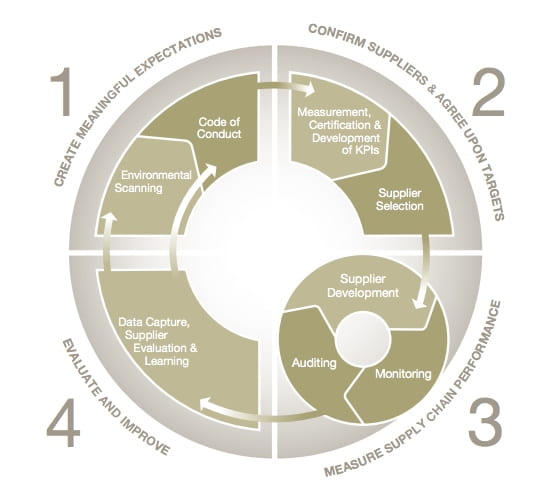SUPPLY CHAIN & INFORMATION SYSTEMS AND SUSTAINABILITY
What is the Relationship Between Sustainability and
Supply Chain and Information Systems?
Supply Chain & Information Systems advances sustainability by maximizing efficiency and responsibility while reducing waste in sourcing, procurement, supplier relations, manufacturing, logistics, packaging, and distribution.
According to the UN Global Compact’s Supply Chain Sustainability: A Practical Guide for Continuous Improvement, supply chain sustainability is “the management of environmental, social and economic impacts, and the encouragement of good governance practices throughout the lifecycles of goods and services.”
Today, mainstream supply chain management media outlets like Supply Chain Digital regularly feature sustainable procurement, circular economy innovations, sustainable logistics, and more. Clearly, sustainable supply chain management and practices can improve environmental performance, optimize end-to-end operations to achieve greater cost savings and profitability, and reduce risk by safeguarding human rights and in many cases bolstering the economic stability of communities.
A Model for Managing Sustainable Global Supply Chains (Source: Network for Business Sustainability)
Why Sustainability Needs Supply Chain and Information Systems
Environmental Defense Fund’s Supply Chain Solutions Center and supply chain services like EcoVadis, SourceMap and Labour Rights Indicator demonstrate that for most companies the supply chain has a greater impact on people and the environment than any other part of their operations.
While most corporate and public focus has been on the sustainability of operations, the supply chain is where the greatest impacts, issues and opportunities for improvement can be found.
The benefits of sustainable supply chain management (UN Global Compact):
Risk management benefits:
-
- Stay ahead of existing and emerging legal and reporting requirements
- Improve identification and avoidance of business disruption risks
- Protect brand and meet demands of current and future investors
Productivity benefits:
-
- Reduce material- and resource-input costs through efficiency improvements
- Reduce waste management, toxics management and EH&S costs
- Increase labor productivity and reduce employee turnover
Growth and innovation benefits:
-
- Stay ahead of changing customer demands, partner requirements and employee preferences
- Bolster supply chain-enabled product innovation

